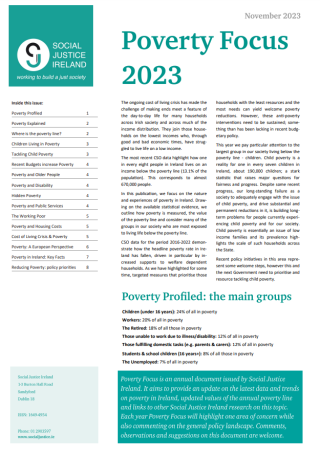Poverty Focus 2023

In Poverty Focus we examine the nature and experiences of poverty in Ireland. Drawing on the available statistical evidence, we outline how poverty is measured, the value of the poverty line and consider many of the groups in our society who are most exposed to living life below the poverty line. This year we pay particular attention to children in poverty.
Poverty Focus 2023 - main findings:
- One in every eight people in Ireland lives on an income below the poverty line (13.1% of the population). This corresponds to almost 670,000 people.
- In 2022, 15.2 per cent of children in Ireland were living in households that were experiencing poverty. That equates to around 190,000 children, a stark statistic that raises major questions for fairness and progress.
- The recent increased political focus on this issue (via the establishment of a Child Poverty and Well-Being Office in the Department of the Taoiseach, the launch of its ‘Initial Programme Plan’ 2023-25, and measures in Budget 2024) is welcome and overdue.
- Child poverty is essentially an issue of low income families and its prevalence highlights the scale of such households across the State. Consequently, child poverty solutions hinge on issues such as adequate adult welfare rates, decent rates of pay and conditions for working parents, and adequate and available public services.
- Targeted measures that prioritise households with the least resources and the most needs can yield welcome poverty reductions. However, these anti-poverty interventions need to be sustained; something than has been lacking in recent budgetary policy.
- Social Justice Ireland warmly welcomes progress in reducing Ireland’s overall poverty rate. However, the underlying trends in the income distribution; where there are small nominal increases in welfare alongside more pronounced increases in earnings and reductions in income taxation are likely to widen income divides and push poverty upwards.
- The impact of inflation is most severe on lower-income households. Short-term Budgetary measures, while welcome, will increase inequality if income adequacy is not properly addressed.